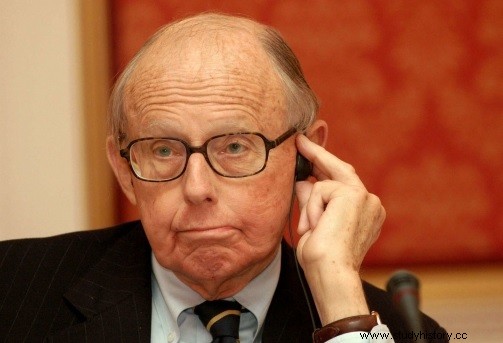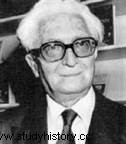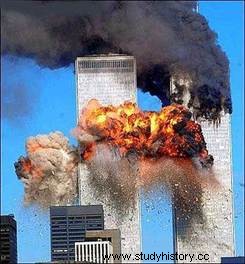 Samuel Huntington's book, Clash of Civilizations , seems to have become the alpha and the omega in trying to explain international problems, particularly since September 11, 2001, and even more in the relationship between “West” and “Islam”. This is precisely where we begin to discern a shift towards a clash that would be between two religions , and that would not be new…However, from the thought (and objectives) of Huntington, to the very concept of civilization and the challenges it poses today, everything is much more complex, of course. A complexity which, as we will see, is precisely the main victim of these concepts. For that, it will be necessary to exceed Huntington.
Samuel Huntington's book, Clash of Civilizations , seems to have become the alpha and the omega in trying to explain international problems, particularly since September 11, 2001, and even more in the relationship between “West” and “Islam”. This is precisely where we begin to discern a shift towards a clash that would be between two religions , and that would not be new…However, from the thought (and objectives) of Huntington, to the very concept of civilization and the challenges it poses today, everything is much more complex, of course. A complexity which, as we will see, is precisely the main victim of these concepts. For that, it will be necessary to exceed Huntington.
The clash of civilizations:Huntington misunderstood?
Professor of political science, Huntington is not a historian and this is already an important element. His book is based on an article for the journal Foreign Affairs and partly intended to inform the American State Department on how the world will turn out after the fall of the USSR in the early 90s. We are not going to analyze the book as a whole here, but to review some of his concepts to mainly show that he was partly caricatured.
 His vision is similar to that of his colleague Fukuyama , author of the equally famous The End of History and the Last Man , which prophesied the victory of democracy and liberalism following the fall of the Soviet ogre…Huntington relies on a model whose civilizations are the basis :the world is made up of these, which are large ensembles in space and in history; they are not political groups, but cultural and religious ones. It announces a resurgence of religious identities. His world is eight main civilizations :
His vision is similar to that of his colleague Fukuyama , author of the equally famous The End of History and the Last Man , which prophesied the victory of democracy and liberalism following the fall of the Soviet ogre…Huntington relies on a model whose civilizations are the basis :the world is made up of these, which are large ensembles in space and in history; they are not political groups, but cultural and religious ones. It announces a resurgence of religious identities. His world is eight main civilizations :
- the West:Western Europe, United States, Australia and New Zealand
- the Orthodox world:mainly Russia
- the Islamic world
- the Hindu world
- the Latin American world
- the Chinese world
- the Japanese world
- the Buddhist world
He adds to it, but having a little trouble defining it, an African (sub-Saharan) world. Note that religion does not necessarily seem to be the main factor , and that it does not mention a Jewish world. It does not describe these civilizations, does not characterize them, but wants to show that the conflicts that will break out will be between civilizations among them, mainly between their flagship states. However, he opposes the idea of a universal civilization, even if certain values may be shared . He then announces, more specifically, that these conflicts will mainly concern two civilizations threatening the West:Islam (without a flagship state) and China. The first would have its demographic weight on its side, the second its economic weight, and the danger would be exacerbated by the West's mania for intervening abroad (Huntington is very critical on this point).
This risk would also be due to the decline of the West , and that is why at the end of his book he argues for a new model which, if he rejects by putting them back to back, multiculturalism and monoculturalism , should make the West return to its identity, not just Christian.
The influence of Braudel and “the house full of objects”
Samuel Huntington develops a culturalist and essentialist vision, where civilization has its own birth and characteristics that lock it in on itself. We see here an open reference to Fernand Braudel (1902-1985), as moreover with Guaino the pen of Sarkozy (and his famous speech on "the African man not entered in history", but also an allusion to the clash of civilizations in a speech of the presidential campaign ). Huntington does not hide it. Braudel's work to consult is Grammaire des civilisations , which dates from 1987 (therefore posthumous, but which includes courses dating from the 60s) but is regularly republished and still recently.
The great French historian defines civilization according to several criteria :a geographical area, the demography, the mode of production, state structures and a culture; this concept aims to bring cultures and societies together, based on the idea of a "house full of objects". We thus have a coherence in space and time:civilization (or culture) is the “total of this repertoire” (the objects of the house and the house itself). This vision, as we know, has greatly pleased historians, firstly because it contrasted with the history of a Marxist tendency that was too eventful, and above all because it reduced the multiple and the complex through global explanations. Civilization even became a character, the subject of sentences ! But this idea is increasingly called into question because it builds schematic and closed wholes, and abolishes dialectics. 
We have said it, Huntington is not a historian but, worse, "he ignores the 'History', because of the permanence it lends to these monolithic civilizations. However, these civilizations are in constant evolution, and they can cross, which rejects Huntington who believes that the possible shock. This is where we can criticize the American researcher the most. On the other hand, it is simplistic to confine Huntington to a vision that would only announce a clash between two religions, Islam and Christianity.
Indeed, on this subject, the influence comes from elsewhere. For the United States (and today beyond), we owe it to Bernard Lewis; this American historian of British origin is a specialist in the Islamic world, and in particular the Ottoman. But he is also close to the American neoconservatives and the Israeli right... In 1964, he publishes an article in which he evokes the concept of "clash of civilizations", of which we can even say that he is the inventor (in its contemporary conception in any case); and 25 years later, he takes up this same concept in The Roots of Muslim Anger , article written following the attacks against American interests in 1979 and 1989; it is the clash between Islam and the West, defined as Judeo-Christian . According to Lewis, the conflict between these two religions (if we combine Judaism and Christianity) has always persisted, in fact since the appearance of Islam in the 7th century and its conquest of part of the Mediterranean.
This representation is, however, even older:we can go back to 18th century Europe, which considers itself rich in knowledge of the world, in the face of a decadent Islam. But we can go back even further, if we rely on the thesis of the historian Henri Pirenne (Muhammad and Charlemagne , 1937) which dates the divide in the Mediterranean from the time of the Muslim conquests (he will be contradicted by Maurice Lombard in Islam in its First Greatness , 1966).
This is a vision that is still widely shared today. For example, we can cite the work edited by E. Brenner , The Republic's Lost Territories , a reference of the Stasi commission (convened following the affair of the Islamic veil). Brenner affirms that France must "be careful not to lose its soul", and that this confrontation is old, that it has "sedimented in the consciences of the people".
“From the class struggle to the clash of religions”
However, this vision based on civilization should not be reduced solely to "Western" thinkers (you should put quotation marks each time you use this kind of term ^ ^), because the jihadists, for example, but also the other “civilizations” often have this same point of view. Thus, Bin Laden , shortly after the attacks on the World Trade Center and the Pentagon declared to agree with the theses of Huntington! The conflict would center on religions and would be eternal, encompassing everything else , from terrorist attacks to anti-Semitic attacks in the streets, etc
The simplicity and effectiveness of these concepts (we will come back to this) have pleased others, notably certain historians, and even more so publishers. Since September 11, we have seen a number of works, both “historical” and political, based on this idea of a clash of civilizations and especially of religions. For example, the book by J.P. Redhead , A clash of religions:the long war between Islam and Christianity (622-2007) , published in 2007. At least that’s clear! According to the author, the conflict has been permanent since 622, and the religious reference is the only one that suffices; he takes as an example the Reconquista, which he considers to be the conflict “of one confession against another”. It completely sets aside the context of an expansion of the West that can be explained with demography, economic growth, political ambitions, etc. It is a vision close to that of Huntington, reduced to religion alone, at the cost of manipulations and simplifications.

The wars of religion and the advent of Civilization
Obviously, religious wars have existed and still exist. They take place in a context where religious pluralism is unsustainable, but for most often social and economic reasons, and in a limited space. Although the effectiveness of religious discourse cannot be denied, it is not cultures or civilizations that go to war, but political entities; for example, we can consider that Islamism is "a political party", with an ideal that is not necessarily religious.
We must also dwell on the feeling of superiority of Western civilization (even if it does not have a monopoly on this complex), and especially on the concept of Civilization . This derives from the word civitas, and we must refer to Erasmus (died 1536), who thereby defines the codes of civility, “the fact of leaving a primitive situation” to move towards progress and civility. Europe took note of a struggle between Islam and Christianity at this time (the Renaissance and the “Turkish peril”) and declared itself the holder of Civilization. We can thus quote Bonaparte who, on the eve of the conquest of Egypt (1798), claimed to "bring Civilization to Egypt" . At the end of his work, it is Huntington who gives a definition of Civilization, which would be a complex mixture of high morality, a good standard of living and... a high religious level! A broader definition than that of Western civilization, which Huntington does not see as universal.
Here we see the link with another current debate, a source of ever-increasing tensions:the growing hostility of Islamic and Asian countries towards a West that would see its values as universal, values thus felt as manifestations of its imperialism...Then arises the problem of the existence of universal values (human rights, women's rights, freedom of conscience, etc.) or not, and the danger of cultural relativism …
Simple, effective…and dangerous concepts
The latest example of the success of these concepts is obviously the controversy over the work of Sylvain Gouguenheim , Aristotle at Mont Saint-Michel , which we have already discussed. To sum up, the controversial thesis of the medievalist makes in a comparatism which turns to the advantage of Europe, a vision frozen in antagonisms by cultural identities with language and religion, where the Koran and the Bible fix the very essence of civilizations . Only the Greco-Christian civilization would be open to Knowledge...
We must therefore take a critical look at these concepts :too simplistic, they lead to simplistic clichés, but are effective and dangerous formulas that mobilize easily. We see it every day, both in the media and among politicians, all the problems seem to be explained under the prism of "civilization" and religion , putting aside so many other elements such as social, economic, demographic, etc. It is obviously much easier to mobilize and above all to manipulate the masses by unifying concepts such as religion and simple to "understand". The enemy today is therefore complexity, and with it science and knowledge.
Article inspired by a lecture by Françoise Micheau, professor of medieval Islam at Paris I Panthéon-Sorbonne.
Bibliography
- articles on The Greeks, the Arabs and us (read in particular the article "Making and unmaking the history of civilizations" by B. Dufal p 317- 358), and on the Gouguenheim affair.
- S. HUNTINGTON, The Clash of Civilizations, Odile Jacob, 2007.
- F. FUKUYAMA, The end of History and the last man, Flammarion, 2008.
- F. BRAUDEL, Grammar of Civilizations, Flammarion, 2008.
